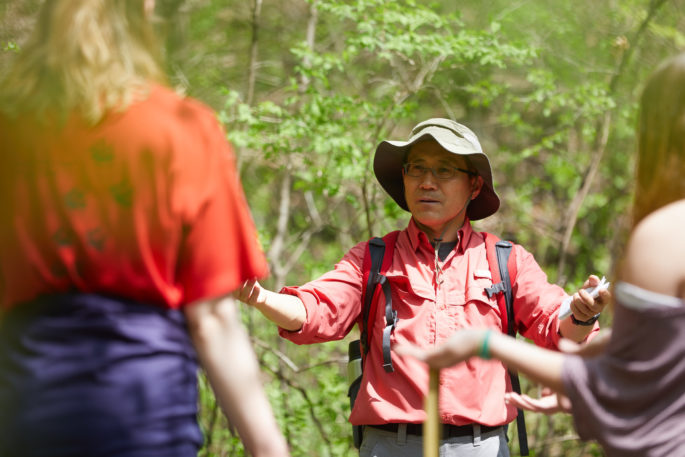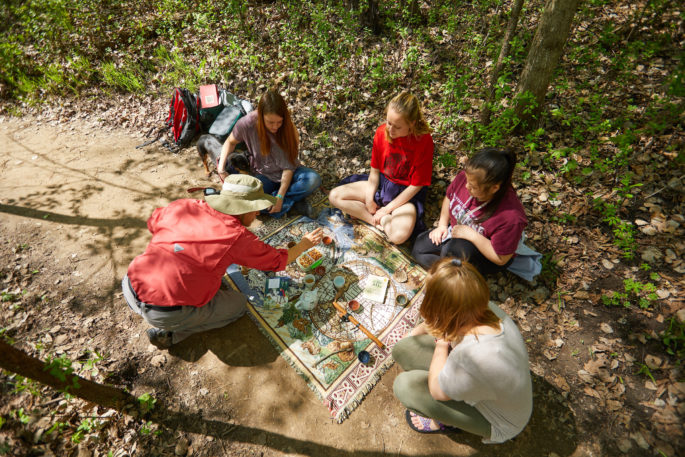Posted p.m. Sunday, June 23, 2019
Assistant prof heads up inaugural nature therapy classes in the U.S.
Assistant prof heads up inaugural nature therapy classes in the U.S.
You might say Namyun Kil grew up outside. “I spent a lot of time outdoors when I was a little boy,” says Kil.
Now an assistant professor in UW-La Crosse’s Recreation Management and Therapeutic Recreation Department, he is sharing that outdoors love with his students — and he’s helping them extend that love to others.
Kil has more than 15 years of experience studying belief, attitude and behavior of recreationists in outdoor and natural environments, particularly U.S. national forests and scenic trails. He’s taught in Korea where he met several forest therapy researchers. He discovered growing efforts to improve health and well-being through nature and forest therapy practices, a practice of supporting healing and wellness through immersion in natural environments.

When Kil started at UWL in 2017, he was given the opportunity to develop a nature and forest therapy course. “I was very happy to accept the offer because the La Crosse area has rich natural resources for nature and forest therapy,” he notes.
That offer allowed Kil to develop and teach the first U.S. course in forest therapy. “The course was a great success,” he notes.
Kil says there are many positive health benefits of nature and forest therapy, including cognitive, emotional, social, physical, spiritual, environmental and other beneficial outcomes. And he has the research to prove it. The findings will be published this fall in the book “International Handbook of Forest Therapy,” edited by well-known forest therapy researchers.
Students who took Kil’s inaugural class learned cultural concepts of nature and forest therapy that originated in Japan and were adapted in Korea. They discovered science-based benefits of the therapy by engaging in various experiential mindful nature connection activities outside of the classroom.
Kil implemented nature and forest therapy walks with students on a Hixon Forest trail following the standard sequence of nature and forest therapy walks developed and established in the U.S. He discovered similar and additional empirical evidence on positive health and well-being.
Kil says the students felt a stronger sense of connections with nature and felt more peaceful, energetic and focused. “They tend to have a stronger sense of their own identity and feel more dependent on the natural areas for the therapy walks to help them achieve such positive benefits,” he explains. “Overall, they tend to feel more satisfied with their life after they engage in nature and forest therapy walks.”
By the end of the semester, Kil says the students felt competent in leading and evaluating nature and forest therapy walks appropriate for clients of all ages with special needs, especially those with mental challenges.
This summer and fall, Kil will conduct a faculty research grant project, and work with staff members and at-risk children in Coulee Connections. He hopes to determine the health benefits of nature and forest therapy on individuals with special needs.
10 tips to enjoy nature

- Leave your cell phone at home. Avoid using it except for emergencies.
- Leave all worries behind. When canoeing or kayaking, put worries under the boat, so they are sunken under the water.
- Pleasure in the moment by doing warm-up exercises utilizing all senses (feeling, listening, smelling, tasting, seeing) before experiencing nature to better engage in all senses simultaneously or one at a time.
- Take slow, mindful movements and/or walk, depending on the type of outdoor therapeutic recreation activity.
- Walk/move in silence. In groups, leave spaces between individuals and whisper.
- Periodically, share and/or document observations about natural environments and yourself. Listen to your heart.
- Do some playful, fun and creative nature connection activities alone or with friends and family.
- Introduce yourself to nature. Talk with natural elements. Hug a tree. Find a relatable nature treasure.
- Spend quiet time, at least 20 minutes, in nature twice weekly.
- Bring medicinal, herbal tea on your walk. Be thankful to nature and ancestors while sipping the tea.
